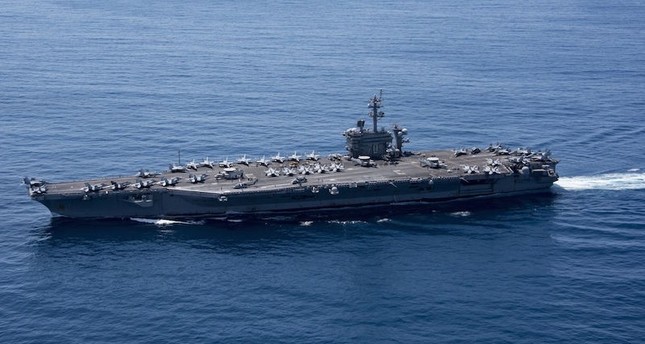North Korea said Sunday that it was" />
North Korea says prepared to strike US aircraft carrier
North Korea said Sunday that it was prepared to sink a U.S. aircraft carrier in a show of its military might, as two Japanese navy ships joined the U.S. carrier group for exercises in the western Pacific.
U.S. President Donald Trump ordered the USS Carl Vinson carrier strike group to sail to waters off the Korean peninsula in response to rising tension over the North’s nuclear and missile tests, and its threats to attack the United States and its Asian allies.
The United States has not specified where the carrier strike group is as it approaches the area. U.S. Vice President Mike Pence said on Saturday it would arrive “within days” but gave no other details.
North Korea remained defiant.
“Our revolutionary forces are combat-ready to sink a U.S. nuclear powered aircraft carrier with a single strike,” the Rodong Sinmun, the newspaper of the North’s ruling Workers’ Party, said in a commentary.
The paper likened the aircraft carrier to a “gross animal” and said a strike on it would be “an actual example to show our military’s force.

This April 15, 2017 file photo shows the aircraft carrier USS Carl Vinson (CVN 70) transiting the Indian Ocean. AFP Photo
The commentary was carried on page three of the newspaper, after a two-page feature about leader Kim Jong Un inspecting a pig farm.
North Korea will mark the 85th anniversary of the foundation of its Korean People’s Army on Tuesday.
It has in the past marked important anniversaries with tests of its weapons.
North Korea has conducted five nuclear tests, two of them last year, and is working to develop nuclear-tipped missiles that can reach the United States.
It has also carried out a series of ballistic missile tests in defiance of United Nations sanctions.
North Korea’s growing nuclear and missile threat is perhaps the most serious security challenge confronting Trump.
He has vowed to prevent the North from being able to hit the United States with a nuclear missile and has said all options are on the table, including a military strike.
Worry in Japan
North Korea says its nuclear program is for self-defense and has warned the United States of a nuclear attack in response to any aggression. It has also threatened to lay waste to South Korea and Japan.
U.S. Defense Secretary Jim Mattis said on Friday North Korea’s recent statements were provocative but had proven to be hollow in the past and should not be trusted.
“We’ve all come to hear their words repeatedly, their word has not proven honest,” Mattis told a news conference in Tel Aviv, before the latest threat to the aircraft carrier.
Japan’s show of naval force reflects growing concern that North Korea could strike it with nuclear or chemical warheads.
Some Japanese ruling party lawmakers are urging Prime Minister Shinzo Abe to acquire strike weapons that could hit North Korean missile forces before any imminent attack.
Japan’s navy, which is mostly a destroyer fleet, is the second largest in Asia after China’s.
The two Japanese warships, the Samidare and Ashigara, left western Japan on Friday to join the Carl Vinson and will “practice a variety of tactics” with the U.S. strike group, the Japan Maritime Self Defence Force said in a statement.
The Japanese force did not specify where the exercises were taking place but by Sunday the destroyers could have reached an area 2,500 km (1,500 miles) south of Japan, which would be waters east of the Philippines.
From there, it could take three days to reach waters off the Korean peninsula. Japan’s ships would accompany the Carl Vinson north at least into the East China Sea, a source with knowledge of the plan said.
U.S. and South Korean officials have been saying for weeks that the North could soon stage another nuclear test, something the United States, China and others have warned against.
South Korea has put is forces on heightened alert.
China, North Korea’s sole major ally which nevertheless opposes Pyongyang’s weapons programs and belligerence, has appealed for calm. The United States has called on China to do more to help defuse the tension.
Last Thursday, Trump praised Chinese efforts to rein in “the menace of North Korea”, after North Korean state media warned the United States of a “super-mighty preemptive strike.”
Source:Daily Sabah
North Korea says prepared to strike US aircraft carrier
North Korea said Sunday that it was prepared to sink a U.S. aircraft carrier in a show of its military might, as two Japanese navy ships joined the U.S. carrier group for exercises in the western Pacific.
U.S. President Donald Trump ordered the USS Carl Vinson carrier strike group to sail to waters off the Korean peninsula in response to rising tension over the North’s nuclear and missile tests, and its threats to attack the United States and its Asian allies.
The United States has not specified where the carrier strike group is as it approaches the area. U.S. Vice President Mike Pence said on Saturday it would arrive “within days” but gave no other details.
North Korea remained defiant.
“Our revolutionary forces are combat-ready to sink a U.S. nuclear powered aircraft carrier with a single strike,” the Rodong Sinmun, the newspaper of the North’s ruling Workers’ Party, said in a commentary.
The paper likened the aircraft carrier to a “gross animal” and said a strike on it would be “an actual example to show our military’s force.

This April 15, 2017 file photo shows the aircraft carrier USS Carl Vinson (CVN 70) transiting the Indian Ocean. AFP Photo